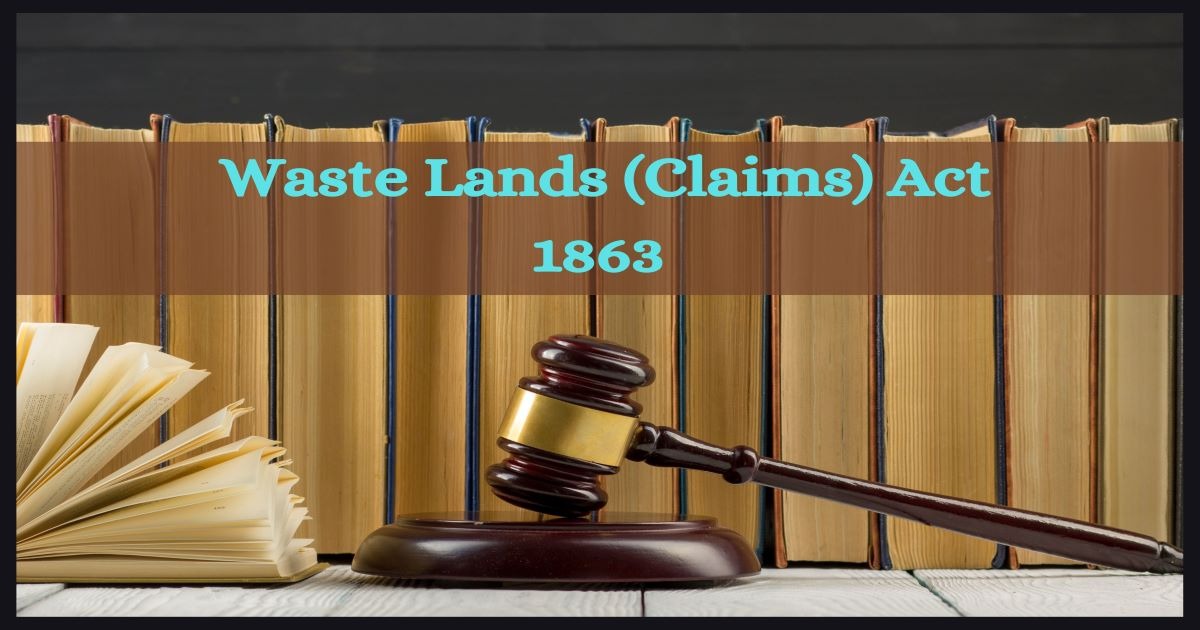Land and water are two of the most important resources for sustainable development. But did you know that 1/6th of India’s land is either covered with wild vegetation or is just barren? These lands that are under or unutilised are called Waste Lands. If you are curious about how the Government of India plans to convert these lands to good use, you are at the right place. This article contains all the information related to Waste Lands (Claims) Act 1863, its purpose and the sections it comprises.
Table of contents
- What is the Waste Lands (Claims) Act?
- What is the Purpose of the Waste Lands (Claims) Act 1863?
- Why is the Waste Lands (Claims) Act Important?
- Sections of Waste Lands (Claims) Act, 1863
- Section 1. Objection Made on the Sale of the Waste Land
- Section 2. Procedure in Such Cases
- Section 3. The Claimant can Challenge Rejection of the Claim
- Section 4. Sale to be Stopped in Case a Claim Appears
- Section 5. Copy of the Order of Rejection
- Section 6. Power to Direct a Suit on Claim
- Section 7. Special Courts for Claims Under this Act
- Section 8. Notice of Formation of Special Courts
- Section 9. Special Court Location
What is the Waste Lands (Claims) Act?
As per the Ministry of Rural Development of India, about 68.35 million hectares of land is currently considered wasteland. To be precise, Jammu and Kashmir comprise the most amount of wasteland in the country. The Government of India is implementing various measures to convert these waste lands into fertile or valuable lands. The Waste Lands (Claims) Act 1863 happens to be one such measure.
What is the Purpose of the Waste Lands (Claims) Act 1863?
The purpose of the Waste Lands Act is for the Government of India to have control over uncultivated or wastelands.
Moreover, several districts report problems with wastelands regularly. They are thus sent for disposal to the government. With Acts like the Waste Lands Act, the government plans to develop these waste lands and put them to sustainable use.
Why is the Waste Lands (Claims) Act Important?
The Waste Lands Act is essential for the development of sectors like agriculture, conserving and mining. It is also important for converting wasteland to common land.
This Act helps prevent land wastage, ensures that every property is put to good use and gains greater value. Earlier, no one bothered to look at waste lands, but today, things have changed. Waste lands can now be renewed for various purposes such as cultivating and manufacturing, all thanks to the Waste Lands Act. It is also vital for:
- Forestry
- Agricultural extension
- Nutrition
- Health Education
- Skill Training
- Conservation
- Animal husbandry
Sections of Waste Lands (Claims) Act, 1863
The Waste Lands Act comprises the following sections:
Section 1. Objection Made on the Sale of the Waste Land
When a claim is made on the wasteland that is documented as sold or any objection is made on the sale of the land, the District or Land Revenue Collector will deal with it. The collector will place an enquiry regarding the objection or claim. However, the collector has to make sure that the time of objection or claim is not less than 3 months.
Section 2. Procedure in Such Cases
The Collector or other head/officer shall reach out to the objector or claimant to gather evidence or supporting documents to make further enquiry. After getting proper proof, the collector shall close the case by either admitting or rejecting the claim or objection. In case the land is said to be sold and is subject to any condition, the collector shall notify the same to the intended purchaser during its sale.
Section 3. The Claimant can Challenge Rejection of the Claim
A pending enquiry can be converted into an objection in this section. The collector can postpone the sale. And if the collector rejects a particular objection or claim, even then, he has the power to postpone the sale of the land and allow the objector to challenge the rejection order.
Section 4. Sale to be Stopped in Case a Claim Appears
If the collector finds out that the claim or objection is yet to be established, he can stop the claim or objection for a short period.
Section 5. Copy of the Order of Rejection
If the collector, head or officer orders for rejection of the claim, he shall produce a copy of that order for the claimant or objector. The objector or claimant shall send a notice within a week of receiving the copy that they intend to challenge for rejection.
Section 6. Power to Direct a Suit on Claim
If the collector admits the objection or claim, the State Government may direct a suit on the same within 12 months after the date of the objection or claim.
Section 7. Special Courts for Claims Under this Act
The State Government has assigned special courts in every district to investigate claims under the Waste Lands Act. It was done to make things easy for everyone.
Section 8. Notice of Formation of Special Courts
When any special court is constituted in the Waste Lands Claims Act, a notice in writing along with its copies is sent to the courts as well as the district magistrate.
Section 9. Special Court Location
The special courts formed under this Act will be established at a place that is accessible and convenient for the respective authorities.





